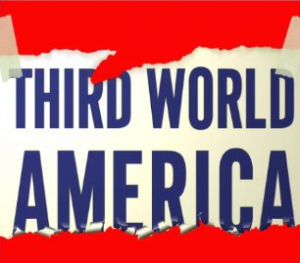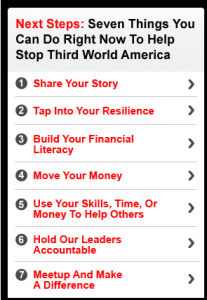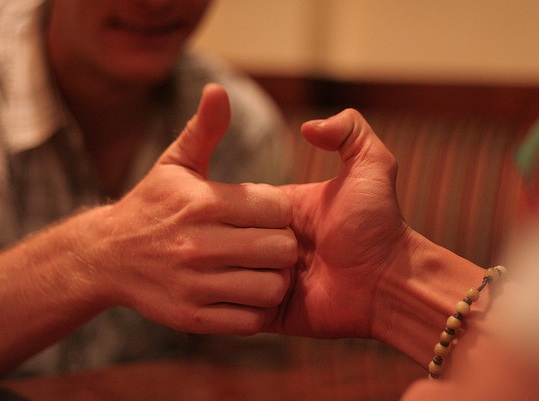Just the other week many questioned American Idol’s crowdsourcing technique of asking audience members to text their vote for their favorites when Pia Toscano was voted off. Crowdsourcing was also in question with President Obama’s “Open for Questions” initiative when questions on the nation’s drug reform were at the top of the public agenda. In fact, the number one issue–not once, but twice–was the legalization of marijuana. And again, when Change.org held its crowdsourcing contest “Ideas for Change,” the legalization of marijuana also floated to the number one spot.
Before you say crowdsourcing is so 2008, give me a second. This may be an oversimplification–but I can’t get the thought out of my head. I understand the benefits of crowdsourcing–but there’s also a time and purpose to applying a crowdsourcing approach.
Here’s the leap: Is voting a form of crowdsourcing?
 Having recently joined the army of weekday commuters, I just finished listening to Arianna Huffington’s Third World America on audiobook. (Note: Bush’s Decision Points is next on my “to read” list as I want to study differing viewpoints and perspectives.) Despite Huffington’s obvious leanings and strong (and sometimes distracting) language, she does make some interesting arguments. One of which is her look at education and its role on our economic and political structures, specifically, the American public’s access to quality information.
Having recently joined the army of weekday commuters, I just finished listening to Arianna Huffington’s Third World America on audiobook. (Note: Bush’s Decision Points is next on my “to read” list as I want to study differing viewpoints and perspectives.) Despite Huffington’s obvious leanings and strong (and sometimes distracting) language, she does make some interesting arguments. One of which is her look at education and its role on our economic and political structures, specifically, the American public’s access to quality information.
httpv://www.youtube.com/watch?v=hu8QDhNeNdQ&
 Have you read Third World America? What were your thoughts and reflections upon reading it? And, is voting a form of crowdsourcing? One of the messages I appreciated most from Huffington’s book was her call for increased civic engagement from citizens ourselves as she did balance her argument asking for both policy changes as well as increased individual accountability.
Have you read Third World America? What were your thoughts and reflections upon reading it? And, is voting a form of crowdsourcing? One of the messages I appreciated most from Huffington’s book was her call for increased civic engagement from citizens ourselves as she did balance her argument asking for both policy changes as well as increased individual accountability.
Though I would have liked to hear more about the solutions she proposes to the problems she outlines, she does encourage people to visit: http://www.huffingtonpost.com/news/third-world-america, as a hub for getting involved and taking action (a smart move on her end I must say).
Additional Resources:
- Third World America: Why I Wrote the Book and What We Need to Do to Save America’s Middle Class by Arianna Huffington
- Editorial: Obama’s Third World America, Washington Times
- How You Can Prevent America from Ever Becoming a Third World Country, Huffington Post
“Seek knowledge. Ask questions.”
]]> The NY Times recently published an article titled, “Tobacco Funds Shrink as Obesity Fight Intensifies,” pitting anti-smoking public health folks against anti-obesity public health folks. The NY Times asked us, in short: Should we focus on addressing obesity over anti-smoking efforts? Is this the right thing?
The NY Times recently published an article titled, “Tobacco Funds Shrink as Obesity Fight Intensifies,” pitting anti-smoking public health folks against anti-obesity public health folks. The NY Times asked us, in short: Should we focus on addressing obesity over anti-smoking efforts? Is this the right thing?
David Katz, Director of Yale University’s Prevention Research Center, published a response via the Huffington Post to examine the “this vs. that” and “right vs. wrong” approach the NY Times took–and asked another question: What choice are we really making?
Now, this is an important one. The NY Times article does do a great job in bringing up the debate: What are our nation’s health priorities? Katz brings up a second good point: How do you divvy resources amongst these health priorities to get the most juice from the squeeze (so to speak)?
First–> Disclaimer–In the words of Katz, I too, am not prepared to answer the NY Times’ question of this or that because I don’t fully know–but then, who does? That said, I have two additions to Katz’s suggestions:
1. Katz first suggests “conduct modeling exercises to determine what general allocation of research and policy dollars — across an array of conditions, behaviors, and even types of research — would most improve our health over a defined period of time.
To this, I say, that we all need to get more involved and clued into the Healthy People 2020 initiative that is run by the U.S. Department of Health and Human Services (disclaimer: This project lies within a client of my employer that I work on). This is a collaborative, science-based approach to setting 10-year national health objectives to promote health and prevent disease. So, when we are talking “this or that” or about our Nation’s health priorities, Healthy People 2020 is a good start. (Stay tuned, in December the Healthy People 2020 objectives will be released along with guidance for achieving the new 10-year targets).
2. Secondly, Katz suggests that we need to be more “holistic.” Going on to say, “A healthy person is healthy…Recent studies have shown that people who don’t smoke, eat well, are active and control their weight are roughly 80 percent less likely to get ANY major chronic disease than their counterparts who do the converse in each case…So, a healthy person doesn’t smoke. A healthy person eats well. A healthy person is physically active.
I couldn’t agree more and this is why–I don’t feel it needs to be an either-or type of situation. It can be all the above. Healthy living (aka living a healthy lifestyle) can be defined by a number of behaviors such as:
- Not smoking
- Eating Right
- Being active
One could argue that other behaviors could be umbrella-ed into healthy living such as getting immunizations or getting preventive screenings. Thus, the message could not just be anti-smoking or anti-obesity, but instead, be about promoting a health lifestyle which encompasses a set number of behaviors. This should be our focus. Thus, I leave you with the same question Katz asks at the conclusion of his Huffington Post article:
What interventions for individuals, families, schools, worksites, communities and more will encourage, promote and empower the adoption and maintenance not of some single preventive strategy, but of healthful living?
flickr credit: lets.book
]]> They say the best things in life are free. They also say that everyone has their price. Up in the Air, a movie starring George Clooney, puts these two sayings on the line.
They say the best things in life are free. They also say that everyone has their price. Up in the Air, a movie starring George Clooney, puts these two sayings on the line.
The storyline is based on Clooney’s character, Ryan Bingham, a corporate downsizing expert who fires people for a living. This quote is taken from the movie during one of the time’s Clooney’s character is firing someone:
This is a wake-up call…Your resume says you minored in French Culinary Arts. Most students work the frier at KFC. You busted tables at IL Picatorre to support yourself. Then you got out of college and started working here. How much did they pay you to give up on your dreams? At what point, were you going to stop and go back to what made you happy?
In response, the man being fired answers: $27,000. During the interaction, you learn that the man has worked for the same company his whole life and now makes $90,000 but that all those years, there was never one happy day on the job. For one blogger, he recounts the day he was offered $9,000/year to work full-time at Kay Bee Toys as the same day he gave up on his dreams. This breaks down to $4.25 an hour. What’s your price?
In January, Taylor Marsh of the Huffington Post wrote that this movie was the best of 2009–saying that it represents a walk through today’s America and captures our current economic moment. I know times are tough–back home, many of our neighbors are looking for jobs. These are smart, talented people who are good at what they do–from lawyers to accountants–the full spectrum. The impact is real.
Dreams Survive
I have to hold on to the idea that dreams are not dead. This isn’t being idealistic–it’s being hopeful. To see what I mean, watch the clip below from the Lemonade Movement. It’s based on one of those other sayings–turning lemons into lemonade. See how 16 people answered their “wake up call:”
httpv://www.youtube.com/watch?v=wJltcT7DH7g&feature=player_embedded
No matter your situation, believe in yourself and your dreams. It’s easier said than done–there’s worries of health insurance, the pressure to provide, there’s reality–so find support, write down your thoughts, reflect and do. Your dreams are waiting for you.
flickr credit: THQInsider
]]>